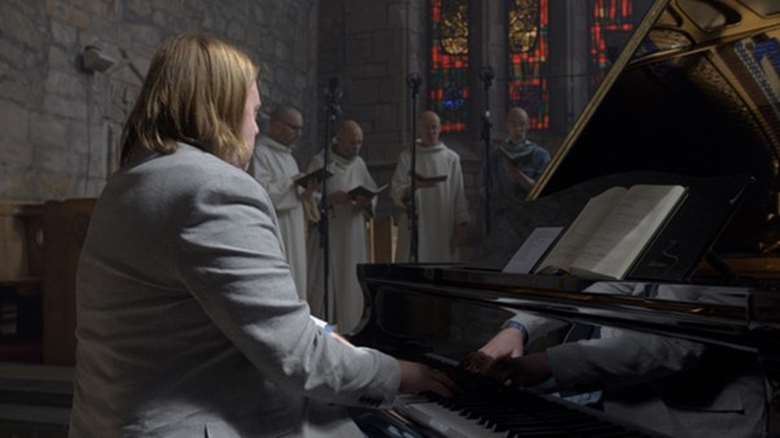Tom Donald on the extraordinary power of music in contemplation
Tom Donald
Thursday, April 20, 2023
Ahead of the release of Pax Aeterna, his collaborative album recorded with the Benedictine Monks of Pluscarden Abbey, the pianist reflects on the history of plainchant and the benefits it can have as a balm for today's divided society

The power of music needs no explanation for most people. The emotional connections, nostalgia, and how music builds a soundtrack to our lives are commonplace for most, even for those without a formal music education. In recent years, much research has been undertaken in fields such as music therapy looking at the arts' ability to heal and rejuvenate those suffering from stress, illness, and trauma. Extensive evidence has also been found to prove music's ability to boost cognitive performance. But there is one area of music that is often overlooked: the ability of music to bring people together in contemplation.
Rediscovering the power of plainchant’s tranquil, flowing melodies has recently emerged as a transformative force in music therapy.
I have experienced this first-hand, firstly by running the London Contemporary School of Piano where I see people from all walks of life, who would otherwise have very little to do with each other socially, bonded together through the power of music. I've also seen this in action as a founding member of the Citizens of the World Choir which integrates asylum seekers into a divided society. I've seen the power of music transform hard-line views and mindsets into camaraderie and compassion in a matter of seconds, something you don’t often see on a current affairs debate show or social media exchange.

The power of musical contemplation is nothing new. It is, in fact, embedded in the very DNA of classical music. Gregorian Chant and the earliest written scores of European Classical Music were born out of contemplation and a need to communicate with a higher power in our Universe. It's no surprise that Gregorian Chant in recent years has become a popular addition to commercial music remixes; the soothing powers of the human voice singing sublime Latin phrases in chant provide the ultimate tonic for an all-consuming modern world. However, imagine how powerful it must have been in its day. Living in 500 AD was a very difficult existence and the contrast between the sublime sounds of these early monophonic chants and the violent, unforgiving existence of the Middle Ages is very difficult to comprehend.

These very roots of Western music, after all, laid the foundations for everything that followed. Plainchant began to gain prominence after Christianity was legalized in the Roman Empire by Emperor Constantine in 313 CE. As the Christian church grew and organized its liturgy, the need for a unified musical tradition became more apparent. This led to the emergence of regional styles of plainchant, including Ambrosian chant (associated with Milan), Old Roman chant, and Mozarabic chant (associated with the Iberian Peninsula).
Originating from the Solesmes Abbey's monastic tradition, the music's free-flowing rhythm captivates the soul. Rediscovering the power of plainchant’s tranquil, flowing melodies has recently emerged as a transformative force in music therapy. Sister Ruth Stanley (OSB) has pioneered its use in hospice care for the elderly, revealing its potent impact on relaxation, coping skills, and overall wellbeing. Her research has shown that just 10 to 15 minutes of plainchant two to three times a day can unlock a profound, innate healing response within our bodies. 

Without this era in Western Music, we wouldn't have the notation, tuning, and harmonic systems we take for granted today. This was something I felt I owed some gratitude towards and the historical significance of the Plain Chant canon has often given me a slight existential crisis as a pianist (not such a relaxing concept). When speaking with a pastor after my Grandfather passed away about 15 years ago; he said, ‘you win all of your battles before you are born.’ You could say the same about Gregorian Chant. The eventual flourishing of musical polyphony from monophony were the battles of a changing European world, which has now given us the most incredible systems, instruments, scales, and harmonies to create music.
It was this need for contemplation and reconnection with the musical mothership of ages past that inspired me to create a new work, where I improvise piano harmony and accompaniment to Monks following the Benedictine tradition at Pluscarden Abbey in Scotland. This is the last monasteries in the British Isles that still practice plainchant in Latin, in seven offices a day. My time machine was a piano, moving between different ages and centuries of music. From an intellectual viewpoint, this project was obviously a dream come true, but mostly from a spiritual and emotional viewpoint, I was nourished and given a once-in-a-lifetime opportunity to record beautiful music in a stunning location with the most authentic practitioners of this music. For that, I am not only changed as a musician but as a person, and I am forever grateful to have been given this moment to reflect and connect with the essence of Western Music in the most authentic way possible.

Tom Donald's album Pax Aeterna is now available for preorder. You can find more information, including how to here.
